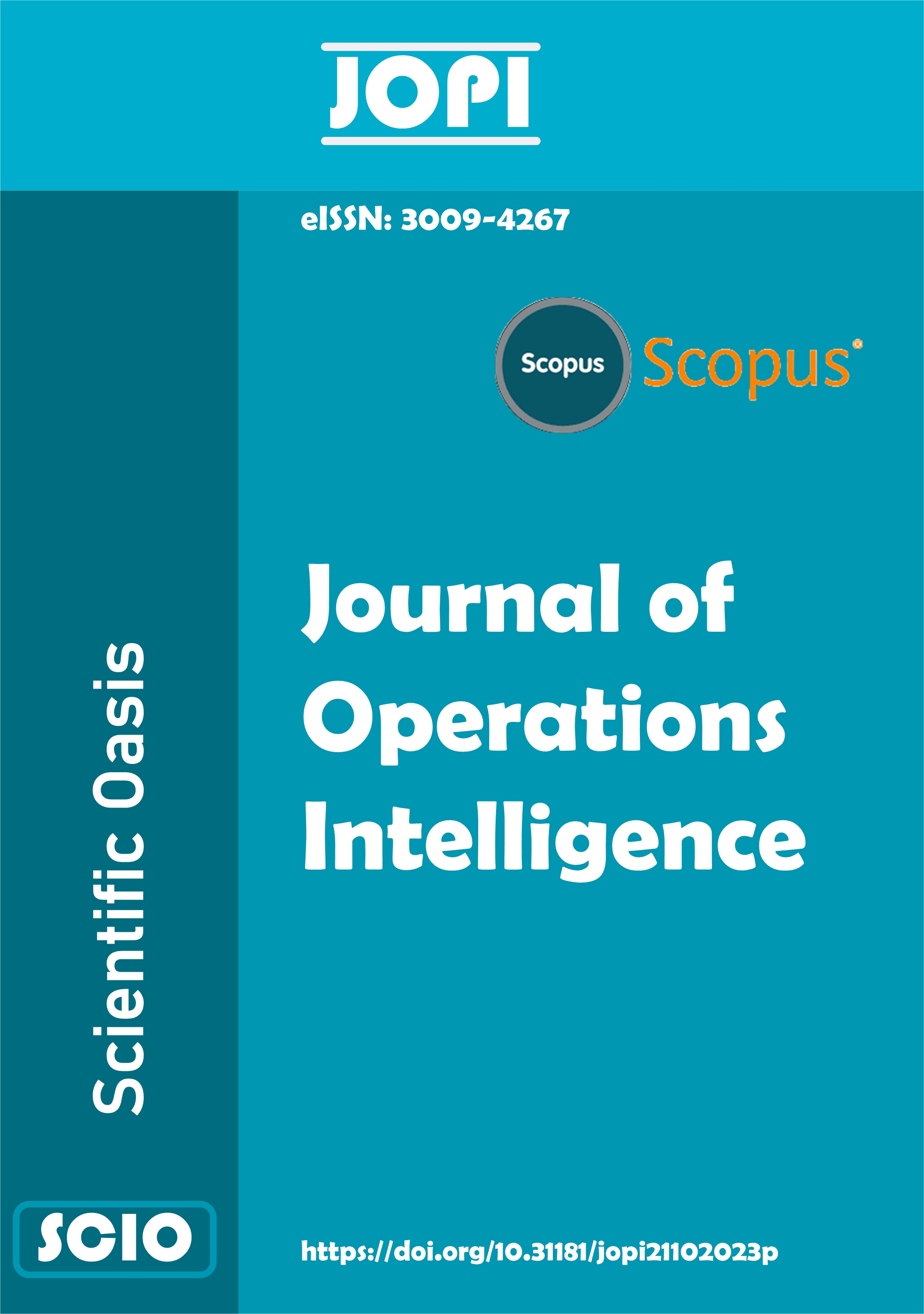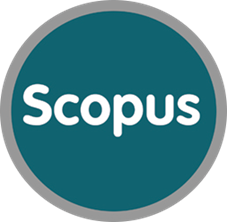Evaluating the Interrelationships of Industrial 5.0 Development Factors Using an Integration Approach of Fermatean Fuzzy Logic
DOI:
https://doi.org/10.31181/jopi21202416Keywords:
Industry 5.0, Fuzzy technique, DEMATELAbstract
The maturation of the Industry 4.0 concept has brought numerous benefits to human society; however, it is not without challenges, including neglect of worker welfare, vulnerability of global supply chains, and environmental degradation. To enhance the adaptability of the Industry 4.0 concept, Industry 5.0 has been developed, though its practical implementation has not yet been fully realized. This paper presents a novel conceptual framework to analyze and evaluate the complex interrelationships of development factors in Industry 5.0. Through extensive literature review and prolonged interviews with experts, three critical dimensions and their 18 key factors for the development of Industry 5.0 have been identified. A combination of Fermatean Fuzzy Sets (FFs) and Decision-Making Trial and Evaluation Laboratory (DEMATEL) has been employed to discern the interrelationships among these factors, and an Influential Network Relationship Map (INRM) has been constructed to aid decision-makers in formulating improvement strategies. The results indicate that "Sustainable Development" is the most influential dimension, with the factors "Renewable Energy," "Data-Driven Analysis Technologies," and "Distributed Control" emerging as the most significant within their respective dimensions.
Downloads
References
Destouet, C., Tlahig, H., Bettayeb, B. & Mazari, B. (2023). Flexible job shop scheduling problem under Industry 5.0: A survey on human reintegration, environmental consideration and resilience improvement. Journal of Manufacturing Systems, 67, 155-173. https://doi.org/10.1016/j.jmsy.2023.01.004
Ahmed, T., Karmaker, C. L., Nasir, S. B., Moktadir, M. A. & Paul, S. K. (2023). Modeling the artificial intelligence-based imperatives of industry 5.0 towards resilient supply chains: A post-COVID-19 pandemic perspective. Computers & Industrial Engineering, 177, 109055. https://doi.org/10.1016/j.cie.2023.109055
Leng, J., Sha, W., Wang, B., Zheng, P., Zhuang, C., Liu, Q., Wuest, T., Mourtzis, D. & Wang, L. (2022). Industry 5.0: Prospect and retrospect. Journal of Manufacturing Systems, 65, 279-295. https://doi.org/10.1016/j.jmsy.2022.09.017
Lu, Y., Zheng, H., Chand, S., Xia, W., Liu, Z., Xu, X., Wang, L., Qin, Z. & Bao, J. (2022). Outlook on human-centric manufacturing towards Industry 5.0. Journal of Manufacturing Systems, 62, 612-627. https://doi.org/10.1016/j.jmsy.2022.02.001
Kasinathan, P., Pugazhendhi, R., Elavarasan, R. M., Ramachandaramurthy, V. K., Ramanathan, V., Subramanian, S., Kumar, S., Nandhagopal, K., Raghavan, R. R. V. & Rangasamy, S. (2022). Realization of Sustainable Development Goals with Disruptive Technologies by Integrating Industry 5.0, Society 5.0, Smart Cities and Villages. Sustainability, 14(22), 15258. https://doi.org/10.3390/su142215258
Dwivedi, A., Agrawal, D., Jha, A. & Mathiyazhagan, K. (2023). Studying the interactions among Industry 5.0 and circular supply chain: Towards attaining sustainable development. Computers & Industrial Engineering, 176, 108927. https://doi.org/10.1016/j.cie.2022.108927
Chang, C.-C., Pai, C.-J. & Lo, H.-W. (2023). Sustainable Development Evaluation of Cultural and Creative Industries Using a Neutrosophic-Based Dematel–Topsis Approach. International Journal of Information Technology & Decision Making, 1-34. https://doi.org/10.1142/S0219622023500426
Gul, M., Lo, H.-W. & Yucesan, M. (2021). Fermatean fuzzy TOPSIS-based approach for occupational risk assessment in manufacturing. Complex & Intelligent Systems, 7, 2635-2653. https://doi.org/10.1007/s40747-021-00417-7
Kao, F.-C., Huang, S.-C. & Lo, H.-W. (2022). A rough-fermatean DEMATEL approach for sustainable development evaluation for the manufacturing industry. International Journal of Fuzzy Systems, 24(7), 3244-3264. https://doi.org/10.1007/s40815-022-01334-8
Jan, M. A., Khan, F., Khan, R., Mastorakis, S., Menon, V. G., Alazab, M. & Watters, P. (2020). Lightweight mutual authentication and privacy-preservation scheme for intelligent wearable devices in industrial-CPS. IEEE transactions on industrial informatics, 17(8), 5829-5839. https://doi.org/10.1109/TII.2020.3043802
Zhang, C., Wang, Z., Zhou, G., Chang, F., Ma, D., Jing, Y., Cheng, W., Ding, K. & Zhao, D. (2023). Towards new-generation human-centric smart manufacturing in Industry 5.0: A systematic review. Advanced Engineering Informatics, 57, 102121. https://doi.org/10.1016/j.aei.2023.102121
Singh, S. K., Yang, L. T. & Park, J. H. (2023). FusionFedBlock: Fusion of blockchain and federated learning to preserve privacy in industry 5.0. Information Fusion, 90, 233-240. https://doi.org/10.1016/j.inffus.2022.09.027
Li, M., Li, M., Ding, H., Ling, S. & Huang, G. Q. (2022). Graduation-inspired synchronization for industry 4.0 planning, scheduling, and execution. Journal of Manufacturing Systems, 64, 94-106. https://doi.org/10.1016/j.jmsy.2022.05.017
Melendez, S., Sima, X., Coudert, T., Geneste, L. & de Valroger, A. (2022). An experience feedback process for learning from collaboration experiences. Computers in Industry, 141, 103693. https://doi.org/10.1016/j.compind.2022.103693
Sindhwani, R., Afridi, S., Kumar, A., Banaitis, A., Luthra, S. & Singh, P. L. (2022). Can industry 5.0 revolutionize the wave of resilience and social value creation? A multi-criteria framework to analyze enablers. Technology in Society, 68, 101887. https://doi.org/10.1016/j.techsoc.2022.101887
Leng, J., Sha, W., Lin, Z., Jing, J., Liu, Q. & Chen, X. (2023). Blockchained smart contract pyramid-driven multi-agent autonomous process control for resilient individualised manufacturing towards Industry 5.0. International Journal of Production Research, 61(13), 4302-4321. https://doi.org/10.1080/00207543.2022.2089929
Karmaker, C. L., Ahmed, T., Ahmed, S., Ali, S. M., Moktadir, M. A. & Kabir, G. (2021). Improving supply chain sustainability in the context of COVID-19 pandemic in an emerging economy: Exploring drivers using an integrated model. Sustainable production and consumption, 26, 411-427. https://doi.org/10.1016/j.spc.2020.09.019
Ghobakhloo, M., Iranmanesh, M., Mubarak, M. F., Mubarik, M., Rejeb, A. & Nilashi, M. (2022). Identifying industry 5.0 contributions to sustainable development: A strategy roadmap for delivering sustainability values. Sustainable Production and Consumption, 33, 716-737. https://doi.org/10.1016/j.spc.2022.08.003
Pinciroli, L., Baraldi, P. & Zio, E. (2023). Maintenance optimization in Industry 4.0. Reliability Engineering & System Safety, 109204. https://doi.org/10.1016/j.ress.2023.109204
Tran, T.-A., Ruppert, T., Eigner, G. & Abonyi, J. (2022). Retrofitting-based development of brownfield industry 4.0 and industry 5.0 solutions. IEEE Access, 10, 64348-64374. https://doi.org/10.1109/ACCESS.2022.3182491
Ojstersek, R., Javernik, A. & Buchmeister, B. (2021). The impact of the collaborative workplace on the production system capacity: Simulation modelling vs. real-world application approach. Advances in Production Engineering & Management, 16(4), 431-442. https://doi.org/10.14743/apem2021.4.411
Orso, V., Ziviani, R., Bacchiega, G., Bondani, G., Spagnolli, A. & Gamberini, L. (2022). Employee-centric innovation: Integrating participatory design and video-analysis to foster the transition to Industry 5.0. Computers & Industrial Engineering, 173, 108661. https://doi.org/10.1016/j.cie.2022.108661
Fraga-Lamas, P., Varela-Barbeito, J. & Fernández-Caramés, T. M. (2021). Next generation auto-identification and traceability technologies for industry 5.0: A methodology and practical use case for the shipbuilding industry. Ieee Access, 9, 140700-140730. https://doi.org/10.1109/ACCESS.2021.3119775
Qahtan, S., Alsattar, H., Zaidan, A., Pamucar, D. & Deveci, M. (2022). Integrated sustainable transportation modelling approaches for electronic passenger vehicle in the context of industry 5.0. Journal of Innovation & Knowledge, 7(4), 100277. https://doi.org/10.1016/j.jik.2022.100277
Nagy, L., Ruppert, T., Löcklin, A. & Abonyi, J. (2022). Hypergraph-based analysis and design of intelligent collaborative manufacturing space. Journal of Manufacturing Systems, 65, 88-103. https://doi.org/10.1016/j.jmsy.2022.08.001
Khan, W. U., Ihsan, A., Nguyen, T. N., Ali, Z. & Javed, M. A. (2022). NOMA-enabled backscatter communications for green transportation in automotive-industry 5.0. IEEE Transactions on Industrial Informatics, 18(11), 7862-7874. https://doi.org/10.1109/TII.2022.3161029
Richnák, P. & Fidlerová, H. (2022). Impact and Potential of Sustainable Development Goals in Dimension of the Technological Revolution Industry 4.0 within the Analysis of Industrial Enterprises. Energies, 15(10), 3697. https://doi.org/10.3390/en15103697
Senapati, T. & Yager, R. R. (2020). Fermatean fuzzy sets. Journal of Ambient Intelligence and Humanized Computing, 11, 663-674. https://doi.org/10.1007/s12652-019-01377-0
Chang, M.-H., Liou, J. J. & Lo, H.-W. (2019). A hybrid MCDM model for evaluating strategic alliance partners in the green biopharmaceutical industry. Sustainability, 11(15), 4065. https://doi.org/10.3390/su11154065
Downloads
Published
Issue
Section
License
Copyright (c) 2024 Huai-Wei Lo, Hsiu-Wen Chan, Jhe-Wei Lin, Sheng-Wei Lin (Author)

This work is licensed under a Creative Commons Attribution 4.0 International License.





















